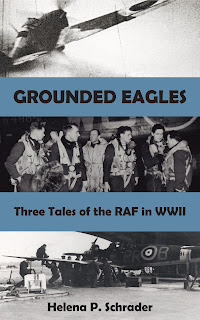The Crew - The Skipper
It took a team to fly a bomber in WWII. Each man aboard had a job to do and veterans stress the degree to which they not only relied on one another but respected one another as professionals. But every team has a captain and in the flying world that was always the pilot.
Yet it was a curiosity of the RAF that the pilot was neither always a commissioned officer nor always the most senior officer on board. Any member of the crew, advancing independently on their own merits and in their own trade, might conceivably hold a higher rank than the pilot. Thus off the aircraft, they might "out rank" their pilot, yet when onboard they were subordinate to him. This peculiarity probably explains why RAF bomber crews tended to refer to their pilot, regardless of his rank, as simply "the skipper."
The skipper/pilot of the aircraft held overall responsibility for the aircraft and its crew. He was expected to make all command decisions, e.g. whether to abort a mission due to technical or crew difficulties, whether to abandon the aircraft in an emergency, or whether to press on despite damage, injuries and/or adverse weather.
A crew, furthermore, was identified officially and collectively by the name of the pilot. The ubiquitous blackboards on which the crews slated to fly a particular mission were posted listed the crews by the name of the pilot. The aircraft might vary or be changed at the last minute, but operationally where the pilot went his crew went too. They were "his" crew.
From early 1942 onwards, the RAF eliminated the position of "Second Pilot" (in American parlance co-pilot), which left the remaining pilot/skipper with the full responsibility of getting a crew home safely. Although sometimes other crew members had limited flying experience, either because they had tried to become pilots but washed out in training or because the pilot gave them informal training on the controls, no other crew member was fully qualified to fly the bomber. The more difficult the situation, whether due to damage, technical failure or weather, the less likely it was that an inexperienced and unqualified crew member could handle the bomber, particularly the heavy, four-engine bombers. Crucially, landing is one of the most difficult and dangerous aspects of flying, which meant a pilot's skills were need to the very last moment of any flight to ensure a safe return to base.
This dependence of all other crewmen on the pilot/skipper for sheer survival was the ultimate basis of his authority. The need to believe in one's pilot tended to create loyalty that transcended issues of rank, race, class, nationality and even personality. Objectivity had nothing to do with this. The odds were stacked against aircrew, and the subconscious psychological need to believe that survival was possible nevertheless often took the form of almost unconscious hero worship for the man who held one's life in his hands. One of the historians at the Imperial War Museum collecting "oral history" by conducting interviews with former RAF Bomber Command aircrew noted (only half jokingly!) that all the veterans attributed their survival to "having the best skipper in Bomber Command."
This doesn't mean all crews liked their pilots/skippers. Guy Gibson was allegedly not liked at all by the men who flew with him. Indeed, it was not uncommon for higher ranking officers to remain comparatively aloof from their crews except when flying and their attitude of crews was more one of respect than friendship. After all, a squadron commander could not afford to unbend and get drunk and silly with his NCO crew mates -- or not very often. As long as he was a first rate pilot, however, the crews accepted that while he wasn't quite "one of the chaps," he was still "their pilot" (and, remember, "the best pilot in Bomber Command.") However, a crew had to trust their pilot or there were problems. This was recognized by the RAF leadership as so essential that if crew members lacked confidence in their pilot they could -- and did -- ask for a replacement. Strange as this may seem, they did not need a concrete reason. It was enough to say that they thought the pilot was "unlucky."
Such instances appear to have been rare, however. Because the crews came together voluntarily (as described in Band of Brothers), crews generally felt an affinity for one another from the start. Furthermore, the long process of operational training built on that initial chemistry to create informal but powerful bonds. While the individual relationship varied, the sense of being a team was usually strong. This meant that crews were loyal to their skipper, often defending and protecting him from "outside" criticism, standing by him, covering for him, and supporting him in a variety of ways off duty.
That identity lasted long after the war and at squadron reunions, men still identified themselves by the name of their skipper. As much as fifty years later, they still saw themselves as belonging to "Stevie's" crew or "Cheese's" etc.
My novels about the RAF in WWII are intended as tributes to the men in the air and on the ground that made a victory in Europe against fascism possible.
Riding the icy, moonlit sky,
they took the war to Hitler.
Their chances of survival were less than fifty percent.
Their average age was 21.
This is the story of just one bomber pilot, his crew and the woman he loved.
It is intended as a tribute to them all.
or Barnes and Noble.

"Where Eagles Never Flew" was the the winner of a Hemingway Award for 20th Century Wartime Fiction and a Maincrest Media Award for Military Fiction. Find out more at: https://crossseaspress.com/where-eagles-never-flew
For more information about all my aviation books visit: https://www.helenapschrader.com/aviation.html







Comments
Post a Comment